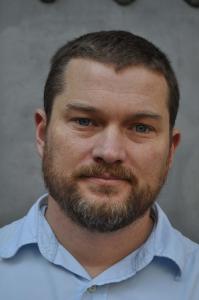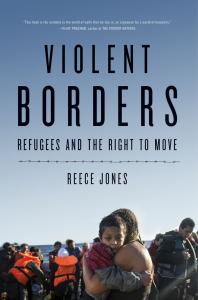New book by UH Manoa associate professor explores borders and the refugee crisis
University of Hawaiʻi at MānoaDrawing on field research in border regions around the world, Violent Borders: Refugees and the Right to Move offers a provocative look at the high cost of border security projects and the dire consequences of these projects for countless migrants. Written by Reece Jones, associate professor from the Geography Department in UH Mānoa’s College of Social Sciences, the book crosses the migrant trails of the world and provides a timely analysis of the changing roles and impacts of borders.
According to Jones, the growth of borders and resource enclosures, and the deaths of migrants in search of a better life, are intimately connected to climate change, environmental degradation and the growth of global wealth inequality.
“While the poor are restricted by the lottery of birth to slum dwellings in the aftershocks of decolonization, the wealthy travel without constraint, exploiting pools of cheap labor and lax environmental regulations,” said Jones. “Forty thousand people died trying to cross international borders in the past decade, with the high-profile deaths along the shores of Europe only accounting for half of the grisly total. These deaths are not exceptional, but rather the result of state attempts to contain populations and control access to resources and opportunities. We may live in an era of globalization, but much of the world is increasingly focused on limiting the free movement of people.”
Listed as one of the Boston Globe’s 20 must-read non-fiction books for this fall, Violent Borders addresses the deeper causes of the world’s migration crisis and recommendations for how to address the inequality and violence that are perpetuated by borders. These recommendations include:
- Create a humane and fair system for refugees to apply for asylum closer to their home country. Many of the deaths at borders were preventable if there had been a safe system for lodging an asylum petition that did not require setting foot in the European Union or United States.
- Establish global standards for wages and working conditions that would slow the outsourcing of American jobs while improving the lives of workers in many poor countries.
- Recognize movement as a human right. The United Nations Declaration of Human Rights already protects freedom of movement inside individual countries, but not between countries.
Jones’s research on border security and violence has been featured in dozens of media outlets around the world, including the New York Times, Time Magazine and The Economist. In addition to Violent Borders: Refugees and the Right to Move (2016, Verso), he authored Border Walls: Security and the War on Terror in the United States, India and Israel (2012, Zed Books), which won the 2013 Julian Minghi Distinguished Book Award for best book in political geography from the Association of American Geographers. He also edited Placing the Border in Everyday Life with Corey Johnson (2014, Ashgate Border Regions Series), which won the Past Presidents’ Gold Book Award from the Association of Borderlands Studies. He is the Forum and Review Editor at the journal Geopolitics and also sits on the editorial board of Political Geography.
MORE ABOUT THE DEPARTMENT OF GEOGRAPHY
Geography (GEOG) studies global changes and their local impacts. It is about the human relationship with the environment and lends understanding to many critical issues that face modern society. The discipline spans natural science, social science, and the humanities, as well as technology, as it engages in questions such as environmental processes, socio-political dynamics, cultural change, and the use of modern geo-spatial technologies. The Department of Geography holds the answers to these challenging issues: globalization and its regional implications, climate change and its effects, resource use and sustainability, cultural change and environmental consequences, geopolitics with changing borders, and spatial digital technologies and the way people interact with the world.
MORE ABOUT THE COLLEGE OF SOCIAL SCIENCES
Marked by leadership, excellence and innovation, the College of Social Sciences (CSS) at the University of Hawai‘i at Mānoa provides students with a culturally diverse experience that transforms them into bold, engaged global citizens who affect change, break down barriers, touch lives and succeed in a multi-cultural context. Its student-centered environment id dedicated to providing students with a vibrant academic climate that affords exciting, intense interaction among students and faculty as they address fundamental questions about human behavior. Featuring outstanding scholarship through internships, active and service learning approaches to teaching, and an international focus particularly in the Asia Pacific region, it prepares students to become leaders in public and private enterprises throughout Hawai‘i and Asia.


